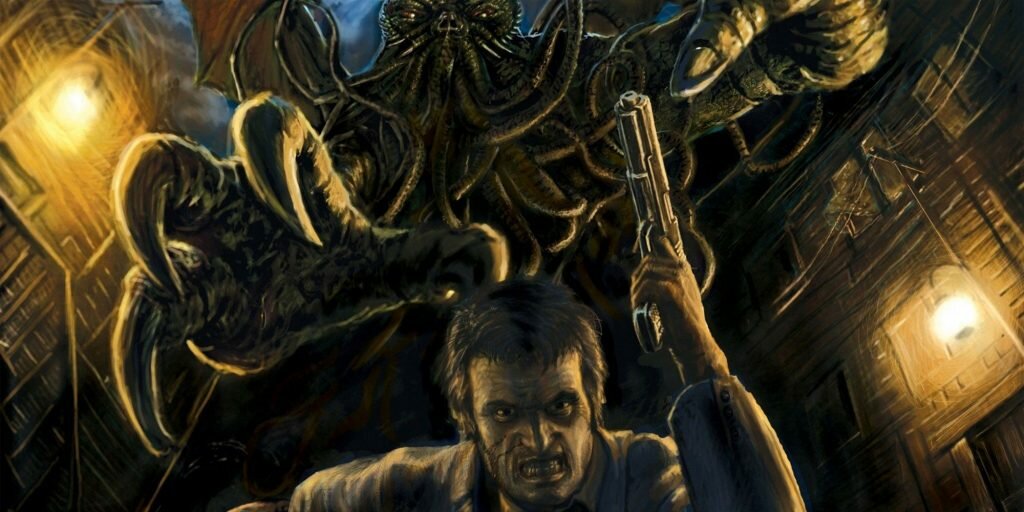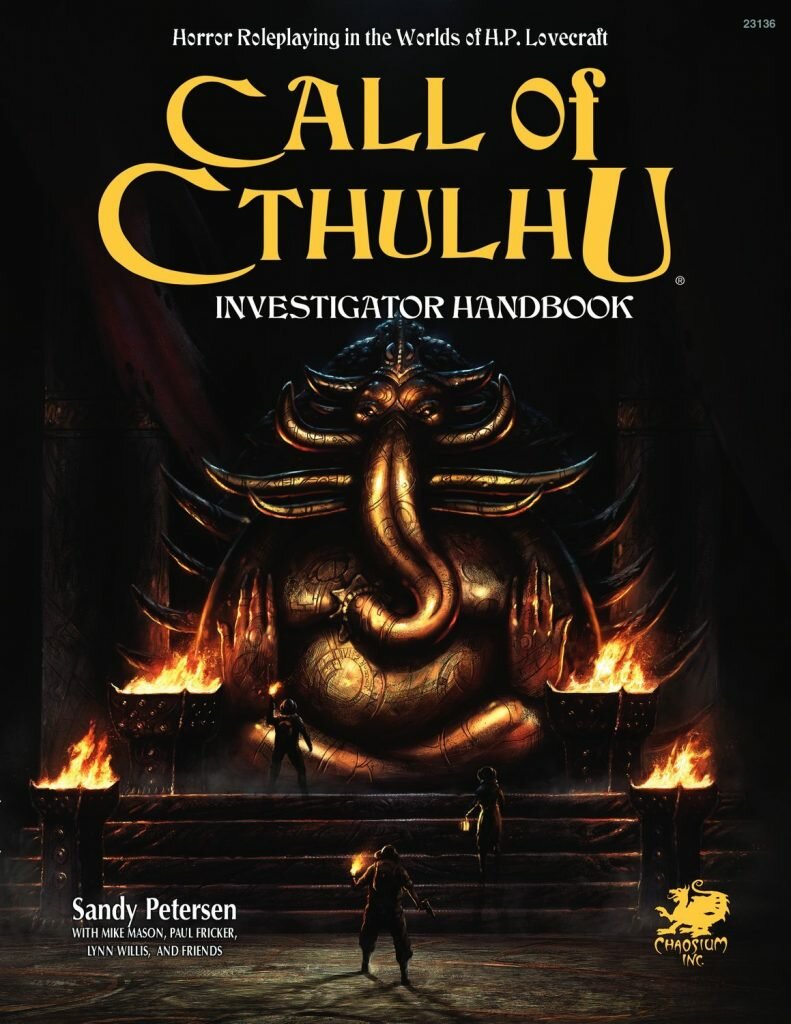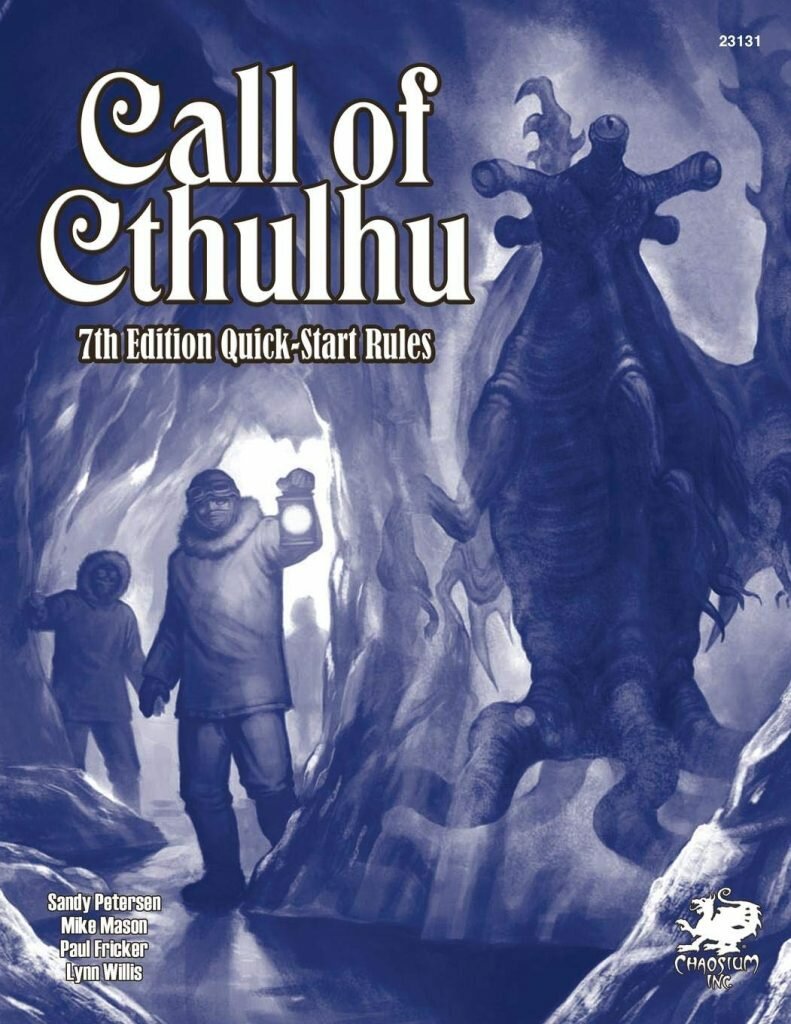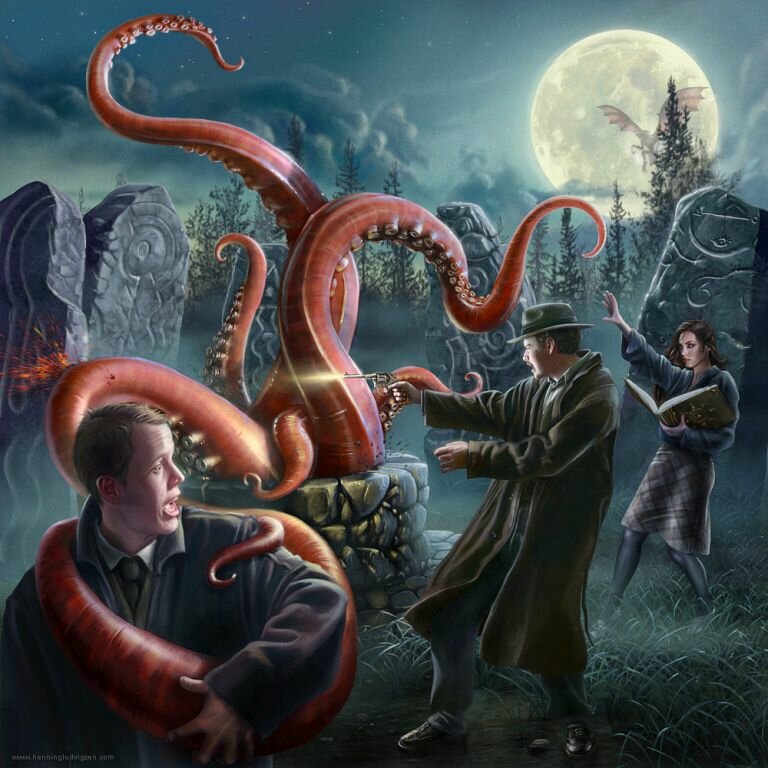CALL OF CTHULU – A Fascinating And Fun Horror TTRPG That Can Challenge Its Origins Of Bigotry
Part One: An Introduction To An Unknown Land
Horror storytelling exists in a multitude of mediums. From comics to movies to campfire stories, you are guided through a fairly linear story to experience the parables and frights orchestrated by its creator. There is a small sense of separation; a buffer from the inescapably horrifying. You can pause the movie, put down the book, or turn off the video game console at any moment of intensity. No matter how scary something may become, you are given an escape hatch that you can open at any time.

But what if I were to tell you that there is a medium where the hatch wasn’t as easily accessible? For the horror to end, you had to ask for that momentary break. I am sure some of you may ask, Is there an entry point into horror where I wasn’t guided by someone else’s train tracks and could explore the warped setting of shadows shaped by my own free will? There is. And that world is the realm of tabletop role-playing games.
Thanks to the popularity of nostalgia-bating television shows, popular online streams, and countless sitcom bottle episodes, the world of role-playing games has brought the medium to the public eye. Chuck some dice, write some notes, slay the beasts and take their gold. But what many people may not know is that there is more to explore within the scene than dark dungeons and dangerous dragons. The world of tabletop role-playing games covers a wide world of genres and concepts. From science fiction and superhero comics, to games about lesbians with swords solving problems with friendship. But in this chaotic sphere of imagination, a large corner is dedicated to horror.
There are a number of popular horror tabletop role-playing games, but today I’d like to introduce to you the crooked tome that started it all. The wicked King In Yellow that brought one of the most, if not THE MOST, popular mythos of mad gods and apathetic beasts to tabletops around the world. That game is Chaosium’s Call of Cthulhu.
Part Two: The Yog-Sothoth In The Room
“Most dangerous and fallacious of the several misconceptions of Americanism is that of the so-called “melting-pot” of races and traditions. It is true that this country has received a vast influx of non-English immigrants who come hither to enjoy without hardship the liberties which our British ancestors carved out in toil and bloodshed… Observation of Europe shows us the relative status and capability of the several races, and we see that the melting together of English gold and alien brass is not very likely to produce any alloy superior or even equal to the original gold.” -H.P. Lovecraft

Lovecraft was a notorious bigot. He was such a bigot, it has cast a shadow over his works, showing us that the existential and unknowable horror that exists within Lovecraft’s stories most likely stems from his point of power as a white man being challenged by a changing world. In the quote above, as well as in many lengthy essays and letters, Lovecraft shares his venomous views of the people he sees as lesser, and how their influences in America brings supposed harm to the people he deems more important.
It is his works that shape and influence Call of Cthulhu as a tabletop role-playing game. But for a game sewn together by the stories and mythos of a man scared of the “other,” Call of Cthulhu prefers to examine the horror of the unknown in all facets as opposed to the horror of the unwanted. Budding from a seed of fear and contempt, Call of Cthulhu has managed to break through into a world of inclusion. From character occupation choices, to the description of items and Ideologies from “a far off land,’ the rulebook tries its best to bring a level of respect one would not expect from a game inspired by America’s most prominent incel.
Part Three: The Birth Of Madness And The Rules It Runs By
First released in 1981, Call of Cthulhu was the brainchild of Sandy Peterson, who was originally a contributor to Chaosium’s fantasy role-playing game RuneQuest. Wanting to write a setting and location sourcebook within Lovecraft’s Dreamlands, Chaosium insisted that Peterson constructed a whole new game existing within the Cthulhu mythos using RuneQuest’s mechanics.
For the next forty years, Call of Cthulhu would go through seven editions, the first three written by Peterson, the fourth edition being written by Lynn Willis, the fifth and sixth by Mike Mason after Willis’ death, and the seventh (current) edition being led by Mason and Paul Fricker. While minor rule adjustments had been made during the first six editions, the seventh edition has seen the most adjustments. But unlike the current state of the more popular fantasy role-playing game, Call of Cthulhu takes little to no conversion through its additions, allowing players access to scour its endless depth of resources.
Unlike the more popular fantasy role-playing games, Call of Cthulhu takes a slower and more methodical approach to the world of role-playing. Instead of fighting mighty beasts and earning rewards and riches, Call of Cthulhu is a game focused on solving mysterious social puzzles, exploring dangerous locations, and succumbing to the inevitable demise of madness of the unknown. The player characters (which beyond this point will be referred to as PCs) are investigators from different socioeconomic and career backgrounds, brought together to solve the mystery constructed by The Keeper (or game master).

First rolling and attributing stat values, players then choose a background and occupation for their character. As a quick sidenote, Call of Cthulhu has a robust list of occupations to choose from, allowing players to create PCs with the same job while having significantly different character builds.
Throughout the game, the PCs will come across situations, like searching for a clue or opening a heavy door, then roll percentage dice (two ten-sided dice, one as the tens digit and the second as the ones digit) under a skill score to determine if their actions are achieved. What stands out about Call of Cthulhu, is that unlike a number of other games, there is no leveling. Your PCs do not have a level. They do not get stronger, or unlock powers, feats, and spells to make themselves more powerful. They will always be feeble humans in a world of unspeakable horror, but grow by using their skills. After each session, a handful of their skills used throughout the session grow by a few percentage points, showing real-world growth and improvement.
The Keeper is the impartial judge of the game, playing and narrating everything within the world outside of the PCs. From published campaigns and scenarios, to forum posts and self written stories, The Keeper guides the PCs through the world of horror and madness. The rulebook has a large portion dedicated to The Keeper. Much of it is your traditional “how to keep the game running” prose, but a significant amount is on how to run horror at the tabletop. While it implies that it is for running the game, the information given here can easily be used for horror writing in any medium, and is worth the read for fans and creators of all things horror.
Part Four: In Which We Meet Our Demise
Call of Cthulhu is my favorite tabletop role-playing game. It may not be the best, or most streamlined. Even compared to other horror games, it isn’t the best. There are a number of things about the game that I am not a fan of. A game-ified chase mechanic exists within the game due to the focus on investigation over combat. The character sheet feels cumbersome at times, leading to a potential halt in game momentum as a player tries to find the one thing they need. The game also has moments where it feels like it can’t truly break from the dated viewpoints of Lovecraft’s bigotry. An example being the Sanity mechanic. Alongside health points, Sanity measures the mental health of a character, which when dropped to zero insists that the character has become crazy and is now a villain. And even though it tries to balance this out with allowing your PCs to seek therapy and other forms of mental healthcare it is possible that the underlying ableism can leave a bad taste in some people’s mouth.

But the beauty of the game is that a well prepared Keeper can avoid these mishandlings. I have been playing the role of the Keeper for over a decade now, and have been able to avoid these problematic pitfalls through healthy conversation with my players. The number of times we have had player characters have their sanity dropped to zero are easily in double digits, and when this happens, we simply remove the PC from play. The beauty of Call of Cthulhu, and tabletop role-playing games as a whole, is that we can not only shape the world explored, but also the rules of play.
Every game that I have ran has featured players of all types. A good number of the players I have had at my table are members of the LGBTQ+ community. Hell, the majority of them were people of color, and we know the type of person Lovecraft was. Yet this doesn’t keep us from enjoying this game, because at the end of the day, the game is fun! For months, we would meet once a week and explore subjects that permeated our everyday lives in a safe environment. We were able to confront rational and irrational fears. Racism, spiders, the death of a friend. Because we had discussed limits beforehand, we knew we could play through these situations and feel empowered.
Call of Cthulhu is a fantastic game. It is for everyone, even though it was birthed through the works of a terrible man. In Japan, it is the number one selling game, with its largest demographic being women between ages 17 and 35. For someone who wrote about exclusion as a solution to their “problems,” the very people who Lovecraft hates have co-opted his writings to be inclusive and celebratory of their differences, showing that when boiled down to its core, hate is nothing more than fear. And that together, fear can be conquered. Or if nor conquered, eviscerated by an indescribable abomination of spacetime.
I encourage anyone that is curious about Call of Cthulhu to pick up a free copy of the quickstart rules and give the game a try for yourself.
If you’d like to read more of T.W.’s work, you can find it here!